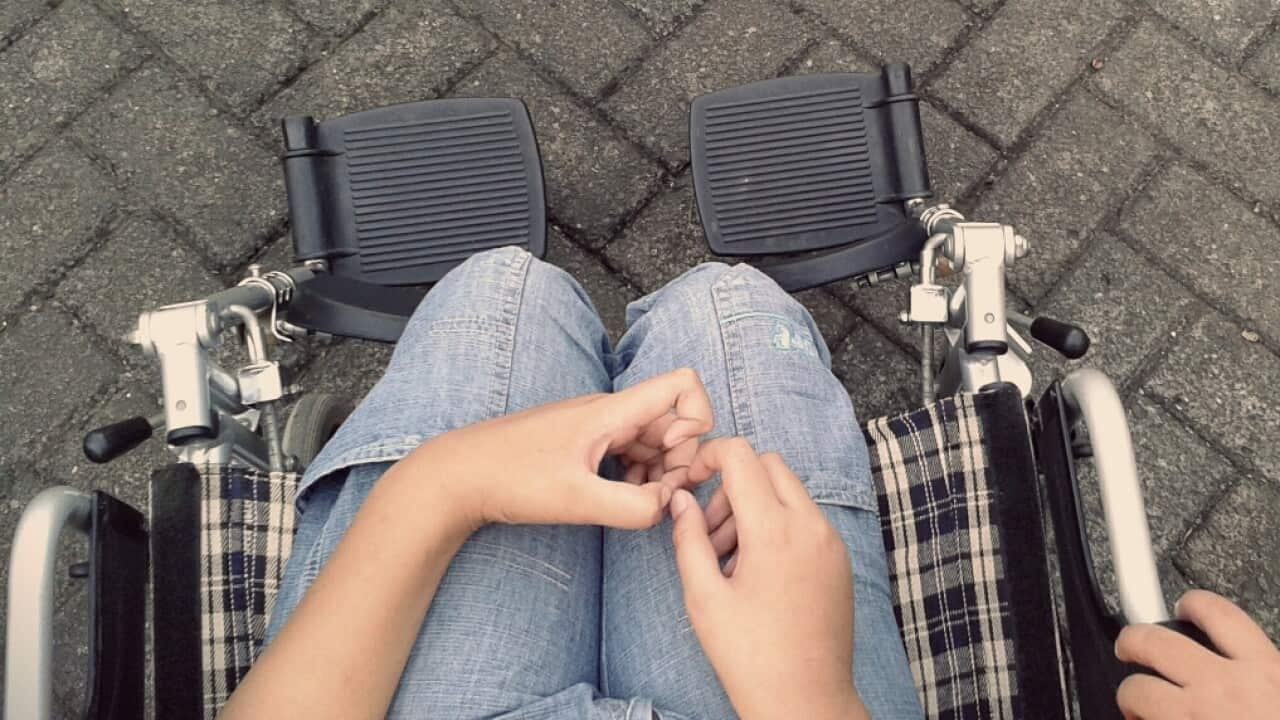Key points
- The NDIS is the nation's disability support scheme - but only helps those under the age of 65.
- Older people with disability have voiced their distress about not receiving enough care from the government.
- They're left wholly dependent on their loved ones, who face the everyday pressure of caring for their family.
After Helen Bonynge lost the use of her legs, she was shocked to find out there was nobody apart from her husband to physically help her.
Helen had undergone pelvic radiation treatment for cancer, leaving her with a condition that wasn't supported under Australia's disability assistance service.
"I just couldn't believe that, here I was, I'd become paralysed and there was no support for me. There was no help. There was no support. And we had to do this ourselves," she told SBS News.
LISTEN TO

The Too Hard Basket - NDIS and the Over-65s
SBS News
07/11/202216:03
John Connolly fell in his father's garden and landed on a pole that gave way. He tumbled two metres on his head and broke his neck. At age 70, he became a paraplegic.
After nine months in hospital and several more in bed, he described his life as a "whole new world".
"You've got to work out how you're going to live the rest of your life," John said.
"You only realise once it's happened, just how incredibly expensive and labour intensive it is to live your lifestyle that you might have had, or any effect, to stay out of one of the institutions' aged care facilities."
With the National Disability Insurance Scheme (NDIS) not covering anyone over 65 who suffers a disabling injury, many like Helen and John are left scrambling for funds to pay for the care they need.
The NDIS - and who it's not helping
Professor of health and social policy at the University of Sydney, Jennifer Smith-Merry, described the NDIS as an "oasis in a desert" - a positive assistance effort, but only for those who are eligible.
"If you're in the NDIS, by the time you're 65, you get something that looks pretty amazing. If you're not in the NDIS, you get something that looks a little bit different, and does not have access to the same sorts of support."
People such as Helen and John who are above the age of 65 receive support through the federal government's 'My Aged Care' services, which offers all older Australians access to in-home care, Home Care Packages, or residential aged care.
NDIS minister Bill Shorten told reporters in September that people who are unhappy with the quality of care for those above the age of 65 "have a point".
"The NDIS, despite all of the challenges, is still a scheme which looks better for people in aged care than what they have," he said at the time.
'Woefully inadequate' alternatives
Helen turned 65 just six weeks before the NDIS was rolled out in her suburb, meaning she was too old to be eligible for the scheme.
Instead, she was assessed by My Aged Care, which funded her $16,000 a year.
It's a figure that won't even cover her manual wheelchair, which is valued at around $17,000.
My Aged Care has four levels of packages for older people with disability, with Helen sitting in an intermediate plan.
The most basic service can grant a person around $9,179 annually, while someone with the highest level of needs can get a maximum of $53,268.
She said that while NDIS creates individual plans, My Aged Care doesn't provide additional payment for a carer - leaving her husband to be her sole carer.
"[My Aged Care] just see my husband is my carer. so I don't get a package that's kind of worthy of paying for carers or cleaners or anything that I need, plus all the equipment that I'm going to need.
"It's just woefully inadequate to look after someone who has a disability.
"It was more that feeling like you've been rejected. You worked all your life, you pay tax, and you just assume that if something goes wrong, you're going to be looked after that. Actually. No, you're not. Not to the level that you need."
'Totally dependent'
It's not just those who are living with a disability over 65 who are impacted - their support networks are also affected.
Bobbi Fisher was the primary carer for her late husband Chris, who became a paraplegic when he was aged 69 after a tragic fall that resulted in a spinal injury.
Needing 24-hour support, Bobbi had to go on a carer's pension of about $900 a fortnight so she could look after her husband, with the support of her children and grandchildren.
"We tried to keep him as happy as we could. And you know, that you could see the frustration in him himself," Bobbi said.
"The effect that was taking on them to see that their once very physical Pa, you know, couldn't do anything."
Their concerns come as the federal government .
But Mr Shorten said lifting the age barrier is not on the agenda for the review.
"When Parliament created the NDIS it was to deal with the gap in disability services younger than 65. What happens to people over 65 is the preserve of the aged care system," he told reporters in October.
"That's certainly not to say we couldn't do more and shouldn't do more for people with disabilities over 65. But lifting that gap is not the focus of this review."











